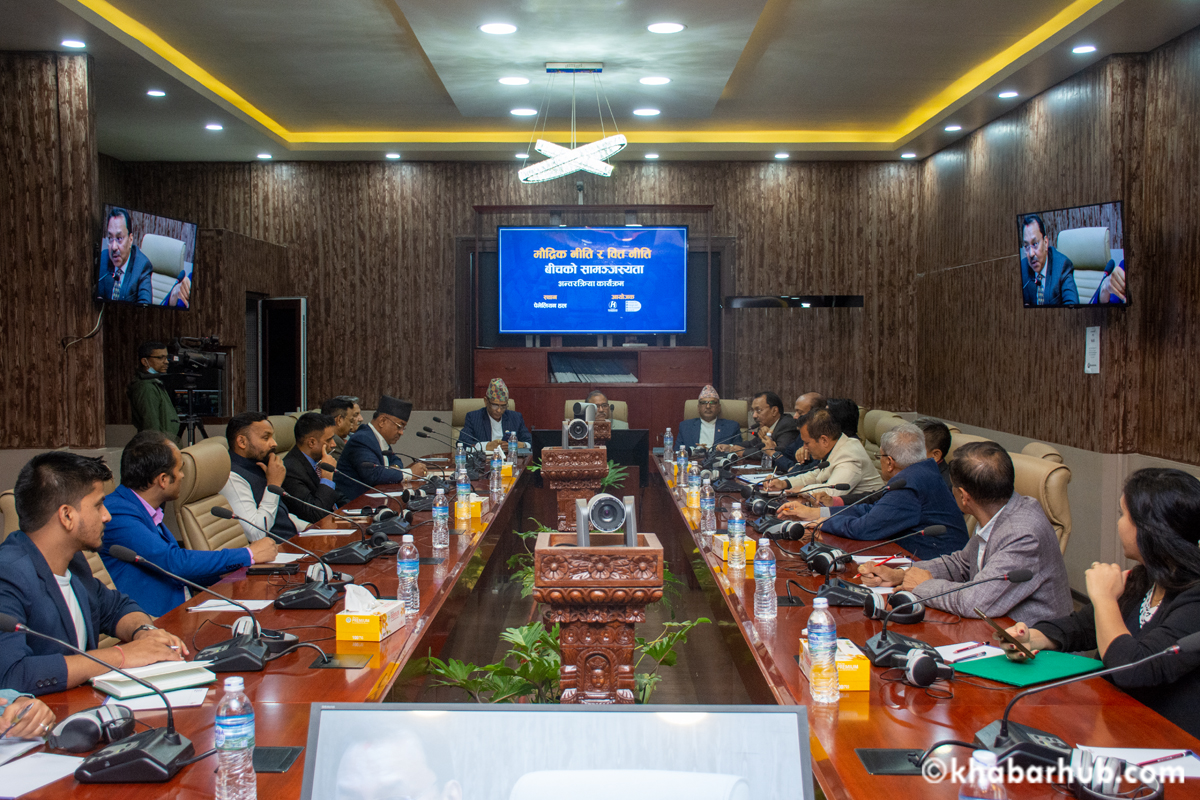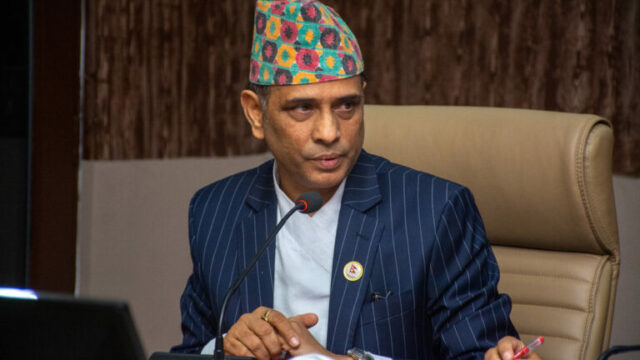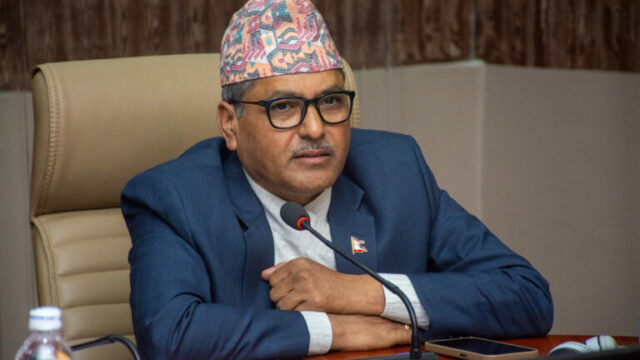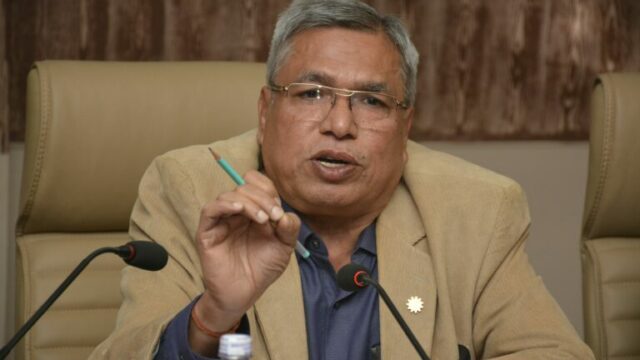0%

Participants at an interaction organized by ISSR and Khabarhub in Kathmandu.
KATHMANDU: Experts and key figures have underscored the importance of realistic budgeting and policy coordination in addressing various contemporary economic and social issues, ranging from the allocation of large budgets to the concerning trend of youth migration.
Taking part in an interaction organized by the Institute for Strategic and Socio-Economic Research (ISSR) and Khabarhub at the Pavilion Hall in Kathmandu, they delve into the topic of ‘Correlation between Monetary Policy and Financial Policy’.
Key figures like Nepal Rastra Bank (NRB) Governor Mahaprasad Adhikari and Secretary of the Ministry of Finance Madhu Kumar Marasini underscored the importance of realistic budgeting and policy coordination in addressing these challenges.
Finance Secretary Marasini acknowledged the existing lack of inter-agency coordination, particularly in meeting budgetary targets, emphasizing the crucial need to translate policy intentions into actionable practices.

He stressed the significance of aligning fiscal and monetary policies to achieve sustained economic growth, citing the current disparity between projected and realized outcomes.
Meanwhile, Governor Adhikari echoed these sentiments, highlighting the pivotal role of ISSR’s program in assessing the efficacy of the current monetary policy and shaping future fiscal strategies.
Providing insights into the progress of the current monetary policy, Governor Adhikari noted achievements in several areas, including inflation control and foreign exchange reserves.
However, he acknowledged shortcomings in lending targets, emphasizing the need for concerted efforts to bridge these gaps.

Contrary to concerns raised by participants like entrepreneur Pawan Golyan regarding the accessibility of agricultural loans, Governor Adhikari assured continued engagement with stakeholders to address such challenges.
He affirmed the central bank’s (Nepal Rastra Bank) commitment to fostering inclusive economic growth through targeted interventions and policy adjustments.
The interaction served as a platform for constructive dialogue and collaborative efforts towards enhancing the coherence and effectiveness of monetary and financial policies in Nepal’s economic landscape.
Even small plans should be sent to lower level: Pradhan
Taking part in the interaction, the Executive Director of Nepal Law Society, Krishna Man Pradhan, expressed skepticism regarding the government’s budget, asserting that it lacks provisions to truly benefit citizens.
He stressed the importance of crafting a user-friendly budget to instill optimism among the populace.
Highlighting the government’s unfavorable stance towards industrialists, Pradhan recounted personal experiences of encountering such attitudes while advocating various legal cases.
He particularly criticized the federal government’s tendency to centralize even minor schemes, advocating instead for their decentralization to provincial and local levels.
Pradhan urged for a halt to the practice of initially proposing large budgets only to scale them back later, emphasizing the need for consistency and transparency in budgetary allocations.
Additionally, Pradhan highlighted the plight of milk businessmen, citing a court order mandating payment to milk farmers, which has not been honored by businessmen.
He advocated for opening up the export of milk to the Indian market as a potential solution to this issue.
GDP calculation should be improved: Agarwal
Rajesh Agarwal, President of the Nepal Industry Confederation, critiqued the government’s methodology for calculating Gross Domestic Product (GDP), labeling the current approach as flawed.
He argued against lumping all sectors together in GDP calculations, asserting that this masks the true state of individual sectors such as hydropower and tourism.
Agarwal called for increased government capital expenditure, noting a concerning downward trend in recent years.
He also highlighted the fluctuating liquidity levels in the banking sector, urging regulators to address this inconsistency.
Furthermore, Agarwal pointed out discrepancies in explanations provided by government agencies, noting the confusion it creates for businessmen.
He emphasized the need for clarity and consistency in communication to support business stability and growth.
Asserting that businesses are struggling to launch new ventures due to prevailing challenges, Agarwal underscored the urgency of addressing liquidity issues to sustain existing enterprises and foster a conducive environment for entrepreneurship.
Let’s pay more attention to fiscal policy: Agarwal
Kamalesh Kumar Agarwal, President of the Nepal Chamber of Commerce, voiced concerns over the abrupt withdrawal of concessions by the NRB following the COVID-19 pandemic, adversely affecting businesses reliant on these concessions.

Agarwal criticized the National Bank for its perceived sluggishness in addressing economic challenges, advocating for a shift in focus towards fiscal policy over monetary policy.
He urged the Central Bank Bank to prioritize the needs of the private sector in its economic assessments.
Highlighting the modest growth rate of the private sector, Agarwal stressed the importance of maintaining a growth trajectory above 5 percent to facilitate sustainable economic expansion.
He underscored the necessity of simplifying financial policies to provide businesses with conducive environments for growth and prosperity.
Budget policy not implemented: Karki
Ganesh Karki, President of the Association of Independent Power Producers, Nepal, lamented the lack of implementation of energy sector policies outlined in the current fiscal year’s budget.
Karki revealed challenges faced by businessmen due to customs restrictions despite budgetary provisions allowing private sector involvement in energy sector imports.
He highlighted the additional hurdle of banks withholding loans citing insurance issues, echoing sentiments questioning the rationale behind such practices.
Karki pointed out the fixed earning potential within the energy sector business, expressing frustration over limited financial opportunities for growth and innovation.
Let’s ensure resources by eliminating non-implementation projects: Singh
Ravi Singh, President of the Federation of Nepal Construction Entreprenuers, raised concerns about the Ministry of Finance’s plethora of plans lacking assured resources, advocating for a strategic approach to resource allocation.
Singh proposed the cancellation of projects without guaranteed implementation and emphasized redirecting resources towards feasible ventures.
He criticized the government for unfairly scapegoating builders nationwide and asserted that businessmen should not bear the burden of incomplete projects solely due to administrative hurdles.
Addressing Finance Secretary Marasini, Singh urged proactive measures to prevent construction professionals from seeking project extensions in the future.
He advocated for transparent communication between the Ministry of Finance and the Ministry of Physical Infrastructure to avoid financial burdens on construction professionals.
Singh contested criticisms alleging concentrated development activities in June, arguing that the construction industry’s vitality directly impacts the broader economy.
He highlighted the construction sector’s significant role in providing employment opportunities, particularly for Nepali laborers, amid a backdrop of overseas migration of youth.